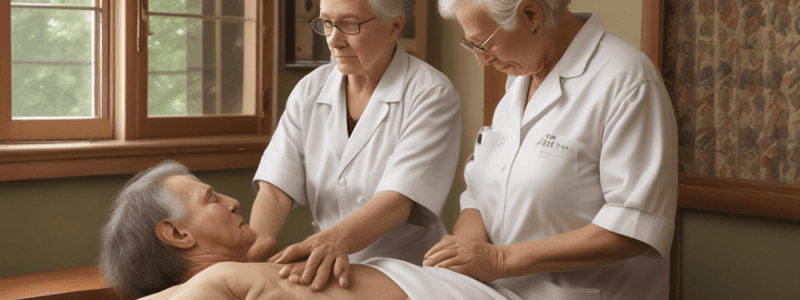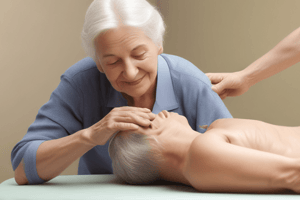Podcast
Questions and Answers
What should the therapist consider when formulating a treatment plan for the elderly population?
What should the therapist consider when formulating a treatment plan for the elderly population?
- Loss of bone and muscle mass
- Declines in muscle tonicity and strength
- Urinary flow disturbances
- All of the above (correct)
What type of massage is recommended for robust elderly clients?
What type of massage is recommended for robust elderly clients?
- Geriatric massage
- Classic Swedish-style massage (correct)
- Gentle joint mobilizations
- Pressure delivered with broad manual tools
What should the therapist be mindful of when delivering pressure to elderly clients?
What should the therapist be mindful of when delivering pressure to elderly clients?
- The amount of inflammation created (correct)
- The number of positions the client is prone to
- The amount of noise in the room
- The client's slower pace
What is a recommended consideration for the massage space when working with elderly clients?
What is a recommended consideration for the massage space when working with elderly clients?
What type of hormone levels may decline in aging men?
What type of hormone levels may decline in aging men?
Flashcards are hidden until you start studying
Study Notes
- The elderly population presents unique challenges in massage therapy.
- Geriatric massage involves massage techniques and applications to meet the needs of the elderly population.
- Aging is a decline in wellness due to functional waning of internal physiology.
- There is increased incidence of disease, medication use, impairment and disability in the elderly population.
- Therapists must consider many anatomical and physiological factors when formulating a treatment plan.
- The elderly population may fall within a continuum of being either robust or frail, depending on varying factors.
- Loss of bone and muscle mass, coupled with waning hormone levels, can create unstable gaits and postures in the elderly.
- Declines in muscle tonicity and strength, coupled with neurological deficits, can create unstable gaits and postures in the elderly.
- In aging females, menopause occurs as levels of estrogens decline and ovarian functions wane.
- In aging men, testosterone may decline steadily.
- Urinary flow disturbances may occur as the prostate may exhibit benign hypertrophy.
- Pancreatic function may decrease, leading to type 2 diabetes mellitus and/or hypoglycemia.
- Respiratory function may be impacted greatly due to an inability of the lungs to defend against pathogens and environmental polluta.
- Massage can be beneficial for the elderly, but certain considerations must be kept in mind.
- When arranging your massage space, be sure to have enough space between furniture and walls so a walker can easily pass.
- Respect the elderly client’s slower pace by allowing ample time for usual intake, massage and post-session tasks.
- Also respect your client’s slower pace rather than maximizing massage time.
- Be sure to have adequate lighting and reduce noise in the room where the intake is conducted.
- Inquire about limitations from impairments or disabilities.
- Limit the number of positions the elderly client is prone to.
- Have an extra blanket available, as many elderly persons experience cold intolerance.
- Ask the client in which positions he or she sleeps at night and reproduce these positions when possible.
- Many elderly clients are uncomfortable or have breathing difficulties while prone.
- Massage is beneficial for reducing stress and improving overall well-being.
- Massage is a classic Swedish-style massage if the client is robust, and gentle joint mobilizations such as rocking are appropriate for the frail elderly.
- Pressure should be delivered with broad manual tools, and be mindful of how much inflammation is created.
- When guiding your client from one area to another, be sure to stand in front of the client or to the left.
- Use descriptive words to describe the room, and establish non-verbal communication with hearing-impaired clients.
- Limit all stretching and joint mobilization techniques when working with clients with mobility challenges.
- Speak in a normal tone of voice when you enter the treatment room, and maintain eye contact.
Studying That Suits You
Use AI to generate personalized quizzes and flashcards to suit your learning preferences.




